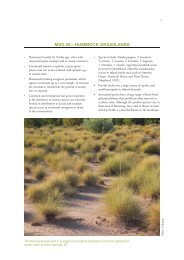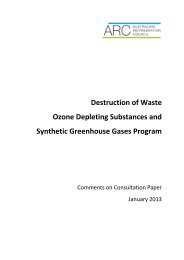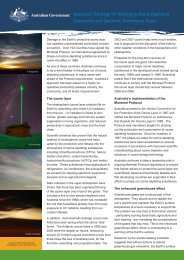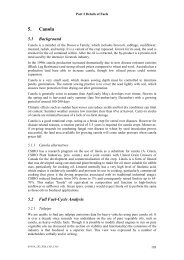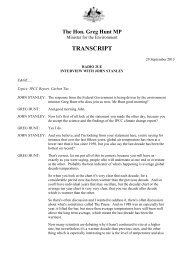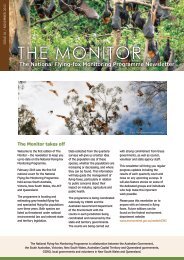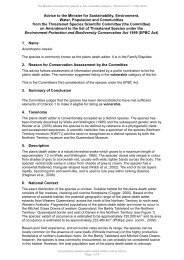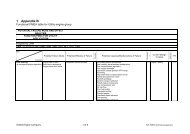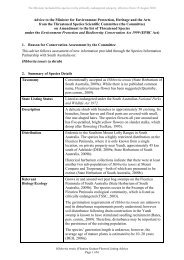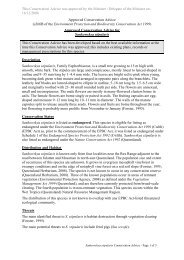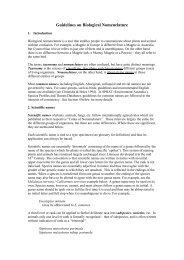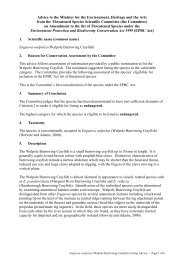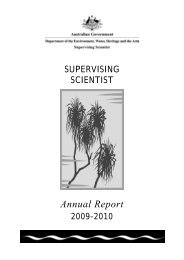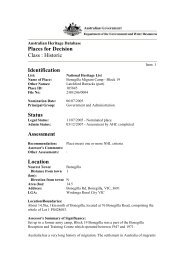Peppermint Box (Eucalyptus odorata) - Department of Sustainability ...
Peppermint Box (Eucalyptus odorata) - Department of Sustainability ...
Peppermint Box (Eucalyptus odorata) - Department of Sustainability ...
You also want an ePaper? Increase the reach of your titles
YUMPU automatically turns print PDFs into web optimized ePapers that Google loves.
What does the listing <strong>of</strong> these ecological<br />
communities mean for land managers?<br />
Protection under the EPBC Act applies to all<br />
components <strong>of</strong> the listed <strong>Peppermint</strong> <strong>Box</strong><br />
(<strong>Eucalyptus</strong> <strong>odorata</strong>) Grassy Woodland <strong>of</strong> South<br />
Australia and Iron-grass Natural Temperate<br />
Grassland <strong>of</strong> South Australia ecological communities.<br />
However, listing <strong>of</strong> these ecological communities<br />
under the EPBC Act will not prevent landholders<br />
from continuing to use their land in the same way<br />
they were before, providing they do not change or<br />
intensify their activities.<br />
National protection means any new or intensified<br />
activities that may be likely to have a significant<br />
impact upon either <strong>of</strong> the listed ecological<br />
communities should be referred to the Australian<br />
Minister for the Environment and Water Resources<br />
for assessment and approval (unless they are subject<br />
to an exemption under the EPBC Act). Activities<br />
that may have a significant impact include, but are<br />
not restricted to, clearing <strong>of</strong> remnants or supporting<br />
vegetation, grazing, introducing excessive nutrients<br />
to remnants and introducing potentially invasive<br />
pasture species into the proximity <strong>of</strong> remnants.<br />
The process for making a referral under the EPBC<br />
Act is easy and without charge. More information<br />
is available from the <strong>Department</strong>’s web site at<br />
www.environment.gov.au/epbc/index.html.<br />
Based on your referral, the Minister will determine<br />
if assessment and approval is required. If approval<br />
is not required, then you are free to take action<br />
in accordance with your referral. If approval is<br />
required, strict timeframes in the EPBC Act ensure<br />
the assessment and approval process is conducted<br />
in a timely manner.<br />
The EPBC Act allows for some exemptions to<br />
the requirement for assessment and approval.<br />
This means that some activities may not need<br />
an assessment or approval if you meet certain<br />
requirements. Information on exemptions is available<br />
online at: www.environment.gov.au/epbc/<br />
publications/exemptions.<br />
13<br />
What are the conservation priorities for the<br />
<strong>Peppermint</strong> <strong>Box</strong> (<strong>Eucalyptus</strong> <strong>odorata</strong>) Grassy<br />
Woodland <strong>of</strong> South Australia and Iron-grass<br />
Natural Temperate Grassland <strong>of</strong> South<br />
Australia?<br />
As part <strong>of</strong> its advice to the Minister, the Threatened<br />
Species Scientific Committee also provides<br />
recommendations on priority conservation actions<br />
that can assist in the recovery <strong>of</strong> these ecological<br />
communities.<br />
The priority actions identified for the <strong>Peppermint</strong><br />
<strong>Box</strong> (<strong>Eucalyptus</strong> <strong>odorata</strong>) Grassy Woodland <strong>of</strong> South<br />
Australia are:<br />
• protection <strong>of</strong> remnants <strong>of</strong> the listed ecological<br />
community through the development <strong>of</strong><br />
conservation agreements and covenants<br />
• control <strong>of</strong> existing weeds in remnants, particularly<br />
Squirrel Tail and Rats Tail Fescue (Vulpia spp.),<br />
Bearded Oats (Avena barbata) and Salvation Jane/<br />
Patterson’s Curse (Echium plantagineum)<br />
• exclusion <strong>of</strong> continuous grazing from remnants<br />
• use <strong>of</strong> strategic grazing (incorporating rest at<br />
appropriate times) in areas with larger numbers<br />
<strong>of</strong> native species<br />
• protection <strong>of</strong> remnants from new weeds by<br />
preventing soil disturbance in and around<br />
remnants, and the speedy eradication <strong>of</strong> any<br />
new invasions and<br />
• expansion and connection <strong>of</strong> existing remnants.<br />
The priority actions identified for the Iron-grass<br />
Natural Temperate Grassland <strong>of</strong> South Australia are:<br />
• protection <strong>of</strong> remnants <strong>of</strong> the listed ecological<br />
community through the development <strong>of</strong><br />
conservation agreements and covenants<br />
• exclusion <strong>of</strong> continuous grazing from remnants,<br />
coupled with weed management and control and<br />
use <strong>of</strong> strategic grazing (incorporating rest at<br />
appropriate times)<br />
• protection <strong>of</strong> remnants from weeds by preventing<br />
soil disturbance in and around remnants, and the<br />
speedy eradication <strong>of</strong> any new invasions and<br />
• expansion and connection <strong>of</strong> existing remnants.<br />
These lists do not encompass all actions that may<br />
be <strong>of</strong> benefit to these ecological communities, but<br />
highlights those that are considered to be <strong>of</strong> the<br />
highest priority at the time <strong>of</strong> listing.



